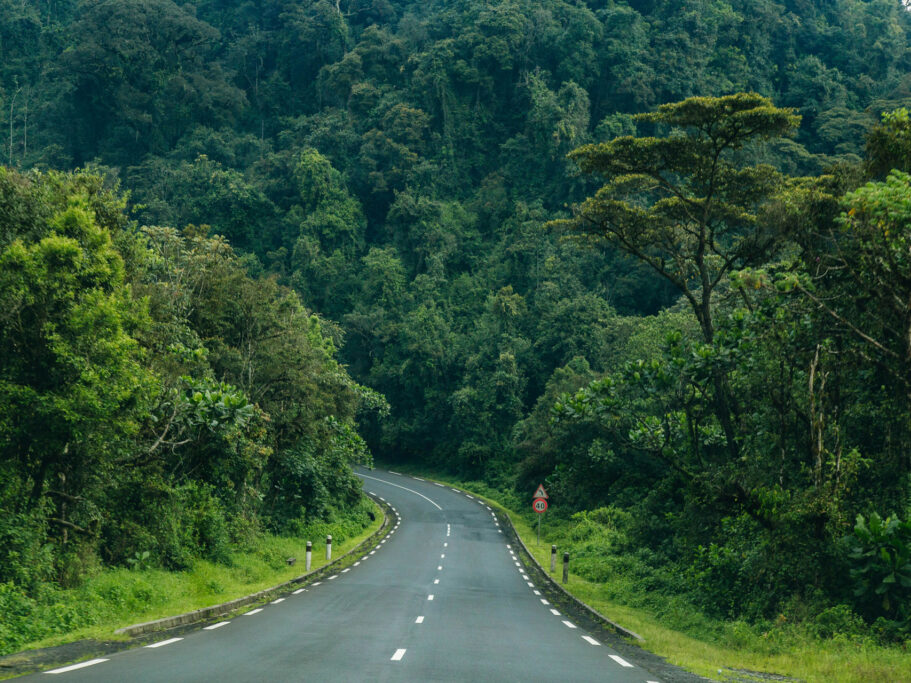NYUNGWE FOREST NATIONAL PARK
CANOPY WALK IN RWANDA
Nyungwe Forest National Park found in Rusizi district in the southwestern part of Rwanda bordering Burundi in the south along with Lake Kivu and Lake Congo in the west plus River Nile in the East, is the biggest and oldest afro- montane rainforest at 1019 square meters boosting tourism industry in Africa.
Nyungwe forest has been in existence since 2004 and it is believed to be the largest and the most conserved montane rainforest on the African continent with the largest number of endemic species in the Albertine Rift Valley montane region this is evidenced by the biodiversity of the ecosystem rich in landscapes, swamps, marshes, bamboo thickest, heath, woodland, and microhabitats.
The park is home to 13 primates including the Ruwenzori colobus, L'Hoest's monkey, Silver monkey, Grey-cheeked Mangabey, Golden monkey, Hamlyn's monkey, Olive baboon, Red-tailed monkey, Velvet monkey, Dent's Mona monkey but majorly famous for Chimpanzees who are divided into two families found in different sections of the park: one family of 30 chimpanzees tracked in Cyamudongo forest and the other of 60 chimpanzees in Nyungwe forest.

What our experts love about Rwanda
Uganda is renowned for its stunning natural beauty, including the Rwenzori Mountains, the Nile River, and numerous national parks like Bwindi Impenetrable National Park, It's a prime destination for wildlife lovers
Lovy - Travel Expert

Nyungwe Forest National Park is a bird paradise with over 322 bird species, for example, Robin-Chat, Barred long Tailed Cuckoo, Blue Turaco, Chapin’s flycatcher, Doherty’s Bush Shrikes, grey-chested Kakamega, Handsome Francolin, Lagden’s Bush Shrikes, Mountain Sooty Boubou, Rockefellers’ sunbird, Purple Throated Sunbird, Red-collared Mountain Babbler, Rwenzori Double Collared Warbler, Rwenzori Nightjar, Rwenzori Turaco, Rwenzori Batis, White Bellied Robin-chat, White Tailed Flycatcher and the Yellow Eyed Black Flycatcher and 29 Albertine rift endemic species.
Other species you are most likely to encounter include 85 mammal species, 200 tree species and 248 orchids, 1068 plant species.
Nyungwe forest receives tropical rainforest for the most months of the year, we there advise clients to carry along warm clothes, as Rwanda’s weather in this zone is very unpredictable.
Activities Around Nyungwe Forest National Park
Several activities are carried out in Nyungwe National Park, which attract visitors from all around the world, and these include guided nature trail hiking, Bird watching, primates trekking, canopy walk, chimpanzee tracking and camping.
Birding in nyungwe forest national park
Birding involves observing birds by their appearance and chitchats in their natural habitats and in Nyungwe forest; it is done in the accompaniment of a professional ranger for safety purposes and also these guides are very knowledgeable and informed about the bird habitats, sounds, lifestyles, attitudes, please feel free to ask them any questions.
Nyungwe National Park harbors over 300 bird species like purple breasted and blue-headed sunbird usually found in the flowering trees and 13 different endemics in Albertine rift, like Craver’swabbler, Sheling crimson wing, Rwenzori Turaco, Large Blue Turaco in the swamps like Kamiranzovou swamp.
We advise our guests to carry along their binoculars, cameras and drinking water and a walking stick as it is a foot activity.
Chimpanzee trekking in nyungwe forest national park
Chimpanzee tracking is the most popular activity done in Nyungwe National Park. The park is home to over 90 chimpanzees with 30 found in the Nyungwe forest and the other 90 in Cyamudongo forest.
All these chimps are habituated to get familiar with human surroundings, which makes them entirely welcoming, and entertaining however only eight people are allowed to trek with the chimpanzees therefore booking a permit in advance is essential.
The trek starts in the morning hours at approximately 0700hrs and it continues for unpredictable time, as the chimps are wild animals they move from one place to another looking for food and water before returning to their nests. Once you track the chimpanzees, you are allowed to spend one hour with them as you watch them feed, play, and breastfeed as well as relax on the tree branches. In addition, the guides provide you with more information about the chimpanzee’s lifestyles, and defense mechanisms and interpret the sign languages used.
These are some of the essential commodities that you require during the chimpanzee trekking; binoculars, permit, Identity card, drinking water, snacks, walking sticks, hiking boots/gum boots.
Camping in nyungwe forest national park
For clients who are interested in spending a night inside the park, the Rwanda Development Board created a camping ground at one of the park quarters to make this possible for nature lovers since there are no other accommodation facilities. The safari tents are tied up on the tree stems tightly to shield the guests from rain, there are also fire places around to provide warmth and modern toilets and bathrooms for convenience. Available tents are hired out at a cost but also guests are free to come with their own facilities.
Canopy walk in nyungwe forest national park
The nature walk in Nyungwe Forest National Park is done either in the morning or in the afternoon and it goes through the Igishigishigi trail, which is 90m in length with gigantic tree ferns but guests that are fit enough can join the other trails namely: Imbaraga and Umuyove trail The trail provides one of the most adventurous experiences and beautiful sceneries of the forest – perfect for photography bringing you to a closer encounter with the different wildlife that has found a home in the forest canopy like 13 primates including the Ruwenzori colobus, L'Hoest's monkey, Silver monkey, Grey-cheeked Mangabey, Golden monkey, Hamlyn's monkey, Olive baboon, Red-tailed monkey, Velvet monkey, Dent's Mona monkey, chimpanzees and over 322 bird species, for example, Robin-Chat, Barred long Tailed Cuckoo, Blue Turaco, Chapin’s flycatcher, Doherty’s Bush Shrikes, grey-chested Kakamega, Handsome Francolin, Lagden’s Bush Shrikes, Mountain Sooty Boubou, Rockefellers’ sunbird, Purple Throated Sunbird, Red-collared Mountain Babbler, Rwenzori Double Collared Warbler, Rwenzori Nightjar, Rwenzori Turaco, Rwenzori Batis, White Bellied Robin-chat, White Tailed Flycatcher and the Yellow Eyed Black Flycatcher and 29 Albertine rift endemic species.
Columbus in nyungwe forest national park
Clients trek 12 primate species alongside the chimpanzees in Nyungwe Forest National Park and among these are the Columbus monkeys, which move in super groups of over 400 in number with the largest group being the Angolan Columbus monkeys that are beautiful to view with their black and white coat, tuffy shoulder pads and a Mohawk physique in Africa and this is in the Nyungwe Forest.
Nyungwe Forest has two habituated groups, one with over 500 individuals in Uwinka (Main head quarter) and other with 60 individuals in Gisakura area.
The Gisakura Columbus trek is less straining compared to the Uwinka trek as they are easily sighted hanging in the tree branches feeding on the fruits as they disperse off the seeds on the ground, swing from tree to tree, the juveniles pushing each other. There is a schedule for the Gisakura trek every day and the starting times are 8am, 10am, 1pm and 3pm. The Uwinka trek being a big group they tend to move broadly in the forest to search for enough food for the group and to escape from the chimps who prey on them. Therefore, it involves a longer trek deeper in the forest starting at 9am.
Clients need hiking shoes, rain jacket, long sleeved shirts and long pants, insect repellant, sunscreen.
How to get to nyungwe forest National Park
Rwanda has only one international airport therefore; clients normally start and end their safari in Kigali City. You can access Nyungwe by either land or air.
With the option of flying, the clients fly directly to the park and land at a given helipad near/inside the park using helicopters. Your will be met by your guide to transfer you to you accommodation. The flight is 45 minutes from Kigali to Nyungwe National Park.
The land option is a 6 – 7 hours’ drive and about 226 kilometers apart. The drive takes you through the magnificent views from the Central Rwanda to South Western Rwanda. Tourists who choose to drive enjoy enroute stopovers at different heritage sites, photography, scenic views.
Both options are comfortable for the guests though people who hate long drives might opt for the flying option.
Talk to an expert
Our Travel Specialists are experts in East Africa adventures. They can answer your questions and help you pick the perfect trip. Contact us to learn more or book your trip today!

If you need any help highlighting the experiences or creating memorable safari, feel free to ask!
CONTACT INFORMATION
© 2024 Berengei African Safaris | Crafted by Robylinks Solutions
